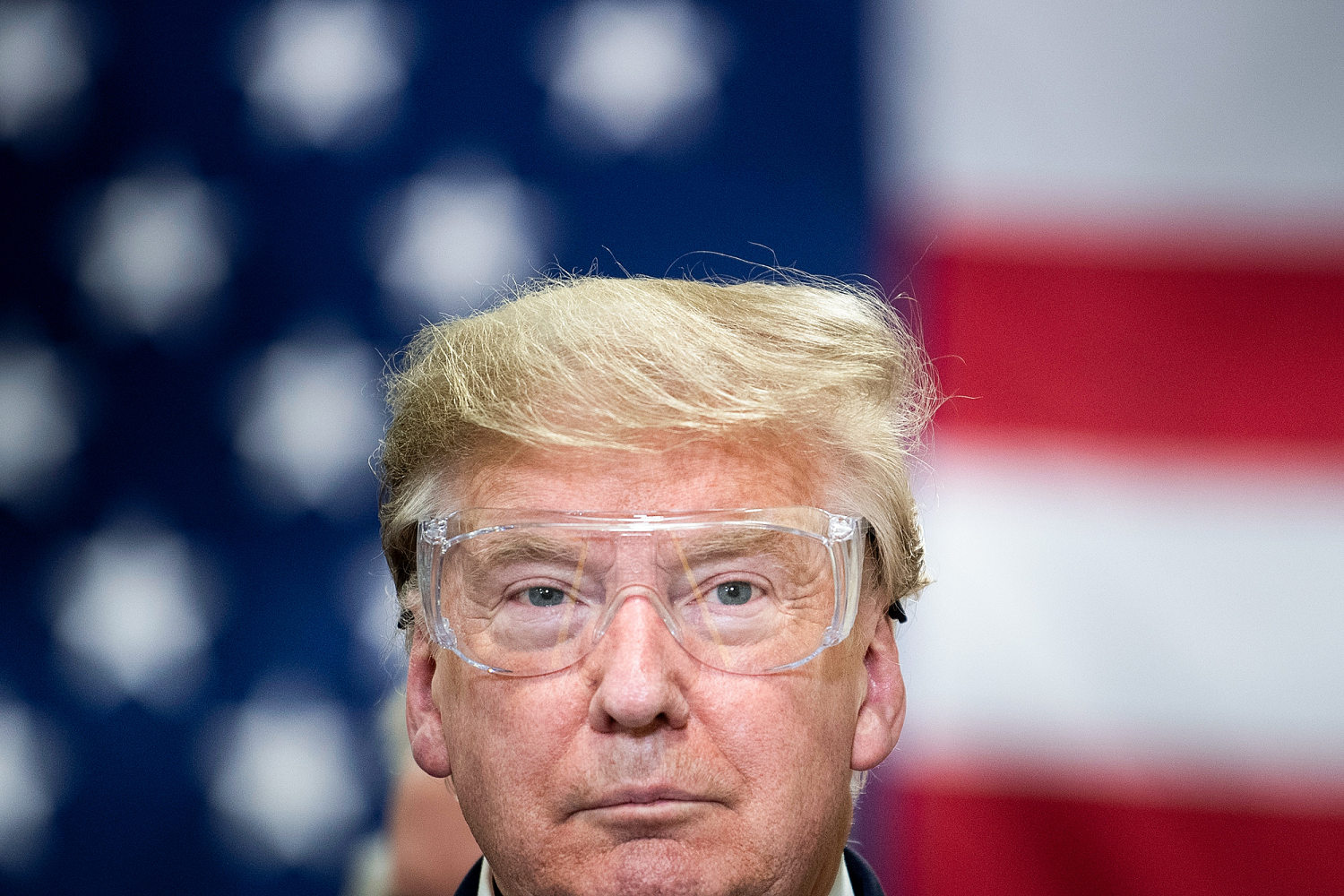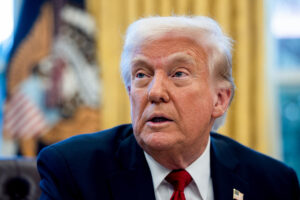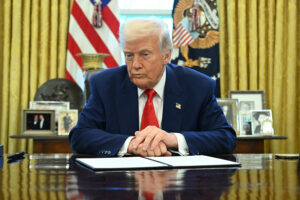The Dictatorship
The most problematic issue with Trump’s manufacturing obsession

Of all the illogical, wildly incoherent and downright bizarre aspects of President Donald Trump’s tariff warthere is perhaps nothing more inexplicable than the White House’s fixation on restoring and reshoring American manufacturing.
It’s hard to think of a worse idea than creating vast economic dislocation to make America a global manufacturing hub.
It’s a goal that is not only unachievable; it’s a terrible idea that ignores America’s key comparative advantage as a provider of global services. This reality, however, has not penetrated the Trump administration’s myopic economic thinking. To listen to the White House talk about tariffs and trade is to hear a message on manufacturing that would have made more sense in the 1970s or 1980s.At a news conference in January, Trump declared that America will “impose new tariffs so that the products on our stores [sic] will once again be stamped with those beautiful words, made in the USA.” Just this week, Deputy Chief of Staff Stephen Miller declared that Trump’s tariffs will “make America the manufacturing capital of the world.”
In testimony before Congress, U.S. Trade Representative Jamieson Greer went even further, stating the president’s view that he wants America “to be a hub for manufacturing and production” and sees trade deficits with other countries as “a manifestation of the loss of the nation’s ability to make, to grow, to build.” According to Greer, “We need to reshore manufacturing.”
No, we don’t.
It’s hard to think of a worse idea than creating vast economic dislocation to make America a global manufacturing hub.
Let’s start with some basic data that seems to have no home in the White House. Manufacturing is a mere 10% of the U.S. GDP and has been steadily declining for years (by comparison, health care is 17.5% of GDP, real estate is around 14% percent and professional and business services account for around 13% of GDP).
The reason is simple: It’s cheaper to manufacture goods overseas, where labor is less expensive. Moreover, automation has steadily decreased the number of American workers needed to produce goods. Even if the White House could reshore manufacturing to the United States, it would hardly produce an employment renaissance.
What is most problematic with Trump’s manufacturing obsession is that it ignores the real engine of U.S. economic growth — services.
Indeed, when Commerce Secretary Howard Lutnick declared recently“We’re going to bring manufacturing back. … Foreign goods may get a little more expensive, but American goods are going to get cheap,” he had this precisely backward. Bringing back American manufacturing by raising tariffs that make foreign exports more expensive will not make goods cheaper. Instead, because of labor costs alone, goods manufactured again in America would become significantly more expensive (according to one estimatemanufacturing the iPhone in the United States would run the price up to $3,500). However, what is most problematic with Trump’s manufacturing obsession is that it ignores the real engine of U.S. economic growth — services.
Service industries, including financial and legal services, health care, education and accounting to real estate, tourism, information technology, software development and media and entertainment, make up 70 percent of the U.S. economy. And they are also a considerable element of America’s export economy. In 2022, services represented 30 % of all U.S. exports.
Yet, this crucial element of the U.S. economy has gone largely unmentioned in Trump’s tariff war. The administration loves to talk about America’s trade deficit but only in terms of manufacturing. It seems the White House is almost embarrassed to talk about the fact that America has a nearly $280 billion trade surplus in services.
One can only assume it’s because Trump can’t conceptualize a product that doesn’t say “Made in the USA”… or perhaps because his understanding of the U.S. economy is stuck in the past — when American companies made cars and televisions or other tangible consumer products.
Whatever the reason, Trump’s obsession with manufacturing is the economic equivalent of missing the forest for the trees. The fact is, even if the U.S. could bring more manufacturing back to the United States, there’s little evidence that it’s what Americans want. If they did, perhaps there wouldn’t have been 482,000 unfilled manufacturing jobs in February.But perhaps the most frustrating element of Trump’s manufacturing focus is that it largely ignores what happened over the last four years in the manufacturing sector. To listen to MAGA-world is to believe that manufacturing in America was decimated during the Biden years. In fact, nearly 800,000 new manufacturing jobs were created during Biden’s presidency (by contrast, the U.S./ health care sector created more than 2.5 million new jobs between the spring of 2020 and March 2024).
This likely doesn’t register with Trump because these manufacturing jobs weren’t in industries like steel or automaking but in semiconductors, battery storage and clean technology. The growth in these industries wasn’t accidental. It was a byproduct of significant pieces of legislation passed in Congress, such as the 2022 Infrastructure Law and the CHIPS and Science Act — both of which had bipartisan support.
The worst part of Trump’s tariff strategy is its incoherence and the acute financial uncertainty it has created.
The new manufacturing industries look very different from those of Trump’s younger days (when he seemed to have formulated his views on trade and tariffs). Rather than producing cars and iPhones or sewing together Levi’s jeans, manufacturing companies today are working with advanced technology, which is befitting an industrialized economy like ours that has left the belching smokestacks of yesteryear behind us. And they are doing more with less. Even as manufacturing employment has fallen dramatically, production has continued to rise.In effect, Trump is trying to revive declining U.S. manufacturing industries at the expense of the ones that are increasingly the most innovative and lucrative. Moreover, his tariff strategy completely ignores the service sector, representing America’s most potent comparative economic advantage on the global stage.
To be sure, the worst part of Trump’s tariff strategy is its incoherence and the acute financial uncertainty it has created. After yesterday’s announcement of a 90-day pause, why would any business want to make a new investment or hire new workers when they don’t know if tariffs will go into effect?
But the real problem with Trump’s tariffs is that his obsession with them reflects a complete misunderstanding of how the economy operates. Voters chose Trump over Kamala Harris because they were concerned about pocketbook issues. The problem is they’ve turned the reins of power over to a president who has no economic clue.
Michael A. Cohen is a columnist for BLN and a senior fellow and co-director of the Afghanistan Assumptions Project at the Center for Strategic Studies at the Fletcher School, Tufts University. He writes the political newsletter Truth and Consequences. He has been a columnist at The Boston Globe, The Guardian and Foreign Policy, and he is the author of three books, the most recent being“Clear and Present Safety: The World Has Never Been Better and Why That Matters to Americans.”
The Dictatorship
Trump tips his hand on his plans to deploy conquered law firms

Several major U.S. law firms have bent the knee to President Donald Trump’s illiberal regime in recent weeks, reportedly committing millions of dollars’ worth of free legal services to help Trump’s administration pursue any number of their political goals.
On Friday, Trump announced that five more law firms made deals with his administration in the face of potential punitive action: Kirkland & Ellis; Latham & Watkins; A&O Shearman; Simpson Thacher & Bartlett; and Cadwalader, Wickersham & Taft.
In social media posts, Trump claimed the firms have agreed to provide free legal work for things like fighting antisemitism, assisting law enforcement and “ensuring fairness in our justice system.” It’s a rather vague list that seems to leave a lot of room for interpretation. Trump, for example, has used dubious claims of antisemitism to wield authoritarian power over college campuses, has routinely lobbed baseless allegations of voter fraud against liberalsand has vowed to address what he called a “definite anti-white feeling” in the country. So, given the descriptions of the work he has secured from these law firms, there’s certainly potential for him to ask them to assist with his antidemocratic ambitions for the executive branch.
The Guardian reported Friday that, in all, this announcement means Trump “has secured a total of $940 million in pro bono work from some of the most powerful law firms in the U.S.”
As my colleague Steve Benen noted recently, Trump has said the law firms he’s targeted did “nothing wrong,” essentially acknowledging that his efforts were about forcing them into submission more than anything else. And he’s clearly more than happy to have them at his disposal, to pursue all sorts of priorities. Trump has said he wants to use these law firms to aid his destructive trade warremarking several times this week that the law firms could be used to help his administration with trade negotiations.
During a Cabinet meeting Thursday, the president told reporters that his administration may be using lawyers at the firms to help agency heads because you’re going to need a lot of lawyers.” Mr. Trump said he would “try to use these very prestigious firms to help us out with the trade” because of the sizable number of countries with which the U.S. will be negotiating. On Wednesday, while speaking to reporters in the Oval Office as he signed executive orders, Mr. Trump said that the firms that entered into agreements to avoid being targeted by his directives have together committed at least $340 million in pro bono legal services and suggested that he could tap into that work as his administration prepares to engage in talks over tariffs he has threatened to impose on foreign countries. I think part of the way I’ll spend some of the money that we’re getting from the law firms in terms of their legal time will be — if we can do it, I think we can do it — using these great law firms to represent us with regard to the many, many countries that we’ll be dealing with,” Mr. Trump said.
I don’t imagine the firms Trump has essentially conquered are eager to spend their resources fighting Trump’s trade war, which is widely unpopular and has been denounced by economists for being rooted in shoddy logic. But this is the natural outcome of these law firms acquiescing to Trump.
I agree with former Attorney General Eric Holder, who in a recent interview with Rachel Maddow denounced these law firms as cowardly and rebuked many of them for refusing to stand alongside other law firms that are fighting the Trump administration’s authoritarian attacks on the legal profession.
These firms have essentially placed themselves at the whim of a wannabe kingno matter how petty, economically destructive or antithetical to democracy his ideas may be.
The Dictatorship
House GOP tramples on women’s rights with passage of SAVE Act

After Donald Trump’s victory in last year’s presidential election, several MAGA influencers cheered the prospect of him trampling on women’s rights. And Republican lawmakers have acted on that ethos with startling speed.
Democratic women sounded the alarm Thursday following the House’s passage of the so-called SAVE Actwhich would require all states to obtain proof of citizenship from people registering to vote, as well as mandate that states have a program to remove undocumented immigrants from existing voter rolls and allow Americans to sue officials who don’t follow the proof-of-citizenship requirements. Voting rights activists have condemned the measure as a voter suppression billsaying it requires documents that members of marginalized groups, particularly nonwhite people, disproportionately lack.
And critics have also said the law runs the risk of disenfranchising women who marry and then change their last name.
“The House just passed the Republican voter suppression measure that threatens voting access for millions of Americans, including 69 million women whose married names don’t match their birth certificates,” Hillary Clinton noted on X.
“Make sure your senators know you expect them to stand against it,” she wrote.
Rep. Alexandria Ocasio-Cortez, D-N.Y., posted a similar message, warning that the legislation risks disenfranchising millions of women.
As did Rep. Shontel Brown of Ohio.
“The SAVE Act is yet another Republican attack on women,” she wrote.
“This bill would make registering to vote extremely difficult for millions of women who have changed their name, including over 2 million Ohioans.
“It’s a propaganda bill that creates problems instead of solving them. #HellNo.”
Conservatives have essentially tried to downplay the impact of the changes if the law is enacted. Sen. Mike Lee of Utah, for example, had an online exchange with Rep. Becca Balint, D-Vt., in which he noted that several documents would be allowed as proof of citizenship — seemingly ignoring that requiring such a document would, in itself, constitute an added barrier for many voters.
And Balint checked Lee on that point.
“[Y]ou can show all the ‘fact’ sheets you want, but this is about practical implications,” she wrote. “If you changed your name, you will not be able to vote unless you jump through excessive hoops that require time, money, and travel if you live in a rural area.”
Fox News host Martha MacCallum also downplayed the suppressive effects of the legislation during an interview with Sen. Elissa Slotkin, D-Mich., saying: “I changed stuff when I got married; it’s not that hard to do that.”
As many have noted, the legislation faces an uphill battle in the Senate, where it’s likely to be filibustered if it’s ever teed up for a vote. But the fact this passed in the House shows just how committed Republicans are to misogynistic gender hierarchy and the prospect of tipping elections in their favor.
The Dictatorship
Trump isn’t just punishing law firms — he’s attempting to rewrite history

On Wednesday, President Donald Trump issued an executive order targeting another law firm in his retribution spree. Trump appears to be using these orders not only to punish lawyers for representing certain clients, but also to rewrite history. And the law firms that capitulate to his extortion are helping to advance the false narrative of election fraud.
The latest order targets Susman Godfried, a Houston-based firm whose primary sin appears to be representing Dominion Voting Systems in defamation suits relating to baseless claims of 2020 election fraud.
The latest order targets Susman Godfried, a Houston-based firm whose primary sin appears to be representing Dominion Voting Systems in defamation suits relating to baseless claims of 2020 election fraud. Susman negotiated the eleventh hour $787 million settlement that Fox News paid in 2023. The firm is also representing Dominion in defamation cases against Newsmax, as well as in cases against former Trump lawyers Rudy Giuliani and Sydney Powell. In fact, the executive order came on the same day a judge in Delaware ruled in favor of Dominion in its case against Newsmax. No one has ever accused Trump of subtlety.
Susman Godfried has vowed to challenge Trump’s action, stating on Wednesday“There is no question that we will fight this unconstitutional order.”
The order suspends security clearances for Susman’s lawyers, terminates government contracts, prohibits government agencies from hiring the firm’s employees, and bars them from federal buildings, a significant obstacle for lawyers handling cases in federal courts. But the order did more than punish Susman. Remarkably, the order also suggests that it is the law firm that has undermined election integrity. “Susman,” the order states, “spearheads efforts to weaponize the American legal system and degrade the quality of American elections.”
A fact sheet accompanying the order puts Wednesday’s action in context of a broader pattern of disturbing revisionism. Under the heading, “A RETURN TO ACCOUNTABILITY,” the order states, “President Trump is delivering on his promise to end the weaponization of government and protect the nation from partisan and bad faith actors who exploit their influence.” From the Oval Office, Trump bragged that many law firms have already paid hundreds of millions of dollars to resolve allegations in executive orders. He did not mention that the payments are coming in the form of in-kind pro bono legal services. And though none of the firms have admitted guilt, Trump said all of the law firms against whom he has taken action have been involved in “election misconduct.”
These allegations have no basis in fact, but the capitulation of major law firms like Paul Weiss, Skadden Arps and others creates the impression that Trump’s accusations are valid. Another five law firms entered into agreements with Trump on Friday to avoid becoming the next targets for punishment, agreeing to provide millions of dollars in pro bono legal services to resolve unsupported claims of misconduct in hiring practices to promote diversity. Their appeasement further advances the public perceptions that these firms must have done something wrong. After all, who would pay hundreds of millions of dollars to resolve a baseless claim?
By caving in to Trump’s demands, the firms may believe they are saving themselves, but they are in fact helping to advance Trump’s disinformation campaign. These firms, which Trump said have agreed to pay from $40 million to $125 million each, are allowing themselves to be used as pawns in Trump’s game to change public perception about his own legal troubles. He is characterizing the enormous payouts as concessions; proof that he has been a victim of what White House aide Will Scharf referred to as “lawfare.”
Consider the other orders. One firm, Covington & Burlingcame under fire for providing pro bono legal services to special counsel Jack Smith, who investigated Trump for unlawfully retaining government documents and interfering in the 2020 election. Perkins Coie represented the Hillary Clinton campaign in 2016. Some firms got blacklisted for employing certain lawyers in the past, such as former special counsel Robert Muellerhis deputy, Andrew Weissmannwho investigated the Trump campaign for connections to Russia and worked on the hush money prosecution in Manhattan.
Of course, these orders would appear to violate the First Amendment right to free association.
Of course, these orders would appear to violate the First Amendment right to free association by punishing every member of an entire law firm solely because of the alleged misdeeds of one of its current or former lawyers. The orders also appear to run afoul of the Sixth Amendment right to the counsel of one’s choice by requiring clients with cases in federal court to go find new attorneys without limits on their access to government buildings. But Trump’s Oval Office remarks suggested that they are something more — part of a false narrative that the investigations of Trump were all cooked up — hoaxes and witch hunts all along.
Three firmsPerkins, WilmerHale and Jenner & Block, have filed lawsuits and obtained temporary restraining orders. Three different judges have found a substantial likelihood of success on the merits of their claims that the orders violate the Constitution. Amicus briefs supporting Perkins Coie have been signed by more than 500 law firms and a number of prominent former senior government officialsincluding officials who were appointed by Republican presidents such as former FBI and CIA Director William Webster and retired Judge J. Michael Luttig. Paul Clementwho served as solicitor general in the administration of George W. Bush, is representing WilmerHale in its lawsuit.
Everyone involved is to be applauded for their courage. These leaders recognize that in combatting the attack on law firms, there is no right and left. There is only right and wrong.
Barbara McQuade is an BLN columnist and NBC News and BLN legal analyst. She is the author of “Attack from Within: How Disinformation is Sabotaging America,”as well as a professor at the University of Michigan Law School and a former U.S. attorney for the Eastern District of Michigan.
-

 The Josh Fourrier Show5 months ago
The Josh Fourrier Show5 months agoDOOMSDAY: Trump won, now what?
-
Uncategorized5 months ago
Bob Good to step down as Freedom Caucus chair this week
-
Uncategorized5 months ago
Johnson plans to bring House GOP short-term spending measure to House floor Wednesday
-

 Politics5 months ago
Politics5 months agoWhat 7 political experts will be watching at Tuesday’s debate
-
Economy5 months ago
Fed moves to protect weakening job market with bold rate cut
-
Economy5 months ago
It’s still the economy: What TV ads tell us about each campaign’s closing message
-

 Politics5 months ago
Politics5 months agoRFK Jr.’s bid to take himself off swing state ballots may scramble mail-in voting
-

 Politics5 months ago
Politics5 months agoHow Republicans could foil Harris’ Supreme Court plans if she’s elected









